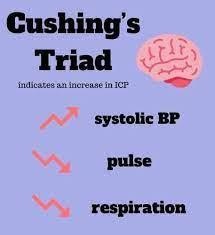The nurse is caring for a client with Cushing's triad. The nurse expects the client to have:
Irregular respirations, bradycardia, and widening pressure
Hypotension, jugular venous distention, and mufled heart sound
Fixed pupils, hypertension, and bradycardia
Bradycardia, hypotension, and bradypnea
The Correct Answer is C
Choice A rationale: Irregular respirations, bradycardia, and widened pulse pressure might indicate increased intracranial pressure.
Choice B rationale: This set of symptoms is often seen in cardiac tamponade and is referred to as the Beck’s triad and not Cushing's triad.
Choice C rationale: Cushing's triad is a set of clinical signs associated with increased intracranial pressure (ICP) and typically includes bradycardia (slow heart rate),
hypertension (elevated blood pressure), and irregular breathing patterns. Fixed pupils can also be present in some cases, but it's important to note that this triad is not always consistently present and may vary from person to person.
Choice D rationale: This set of symptoms describes symptoms of shock, not specifically Cushing's triad.

Nursing Test Bank
Naxlex Comprehensive Predictor Exams
Related Questions
Correct Answer is A
Explanation
Choice A rationale: Propranolol, a beta-blocker used for high blood pressure and other cardiovascular conditions, is known to have potential side effects of sexual dysfunction, including erectile dysfunction (ED).
Choice B rationale: Ranitidine (Zantac) is an H2 blocker used for acid reflux and isn't typically associated with causing ED.
Choice C rationale: Atorvastatin (Lipitor), a statin used for high cholesterol, isn't commonly associated with causing ED.
Choice D rationale: Metformin (Glucophage), used for type 2 diabetes, is not typically linked to causing ED.
Correct Answer is A
Explanation
Choice A rationale: Cellulitis management typically involves wound care, antibiotics, and monitoring. It's a suitable assignment for a new graduate nurse to begin learning about wound management and diabetic care.
Choice B rationale: Post-operative care for an amputation requires experience in assessing and managing post-surgical complications, which might not be suitable for a new graduate nurse.
Choice C rationale: Diabetic ketoacidosis management involves complex insulin therapy and critical care, which might be overwhelming for a new graduate nurse.
Choice D rationale: While hyperglycemia requires monitoring and intervention, the cause and severity need to be determined before assigning this patient to a new
graduate nurse.
Whether you are a student looking to ace your exams or a practicing nurse seeking to enhance your expertise , our nursing education contents will empower you with the confidence and competence to make a difference in the lives of patients and become a respected leader in the healthcare field.
Visit Naxlex, invest in your future and unlock endless possibilities with our unparalleled nursing education contents today
Report Wrong Answer on the Current Question
Do you disagree with the answer? If yes, what is your expected answer? Explain.
Kindly be descriptive with the issue you are facing.
